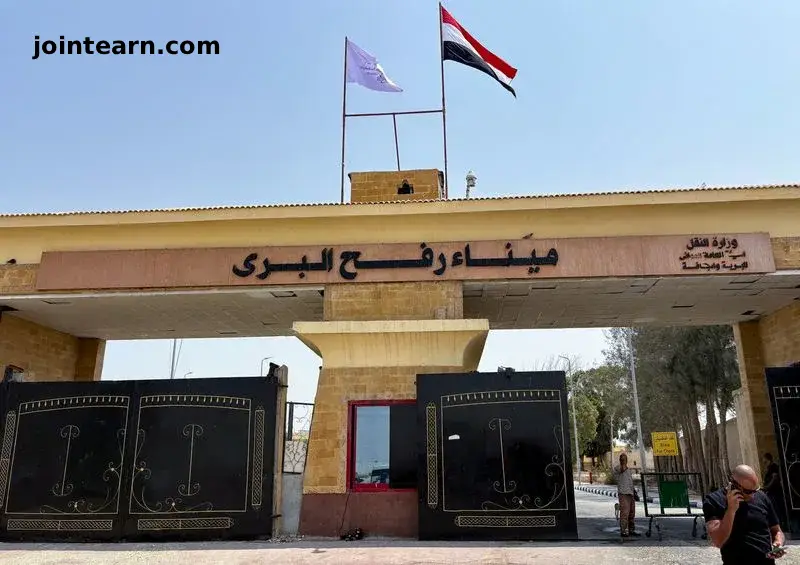
JERUSALEM – Israel confirmed on Thursday that preparations are underway with Egyptian authorities to reopen the Rafah border crossing between Egypt and the Gaza Strip, a critical gateway for the movement of people in and out of the war-torn enclave.
The Israeli military’s Coordination of Government Activities in the Territories (COGAT) said in a statement that discussions are ongoing between Jerusalem and Cairo, but a definitive date for reopening Rafah will be announced later. The crossing, located at Gaza’s southern border, is the enclave’s primary route to the outside world not controlled directly by Israel.
A Key Border Lifeline Between Gaza and Egypt
The Rafah crossing, situated along the Egypt-Gaza border, serves as a vital link for millions of Palestinians seeking medical treatment, education, and family reunification abroad. It was closed earlier this year following renewed violence between Israel and Hamas, which had already devastated Gaza’s infrastructure after two years of intermittent warfare.
COGAT emphasized that while coordination continues, humanitarian aid will not be transported via Rafah, as that route “was never agreed upon at any stage.” Instead, relief supplies and food shipments continue to flow through the Kerem Shalom crossing and other entry points under Israeli control.
“Preparations are ongoing with Egypt for the movement of people through Rafah. The exact reopening date will be announced later,” the agency said.
“It should be emphasized that humanitarian aid will not pass through the Rafah crossing,” COGAT added.
Humanitarian Context and Ceasefire Tensions
Israel’s announcement follows reports that the Rafah crossing was initially expected to open on Thursday, according to sources who spoke to Reuters. However, mounting diplomatic tensions have delayed that plan.
The delay comes amid signs of fragility in the ceasefire between Israel and Hamas, which ended nearly two years of devastating conflict. Israel has accused Hamas of delaying the return of the bodies of deceased hostages, a condition tied to the broader truce agreement that also saw all living Israeli hostages released in recent weeks.
Israeli officials warned earlier in the week that the Rafah reopening could be postponed if Hamas continued to “violate the spirit of the ceasefire.”
The Israeli government said it remains committed to maintaining security oversight of Gaza’s borders while allowing limited humanitarian operations under international supervision.
Egypt’s Role in Mediation and Coordination
Egypt, which has long served as a mediator in Israel-Hamas negotiations, is playing a central role in coordinating logistics for the reopening. Cairo has maintained constant dialogue with both Israel and Palestinian authorities, stressing the need to restore limited civilian movement while ensuring security controls remain intact.
Egyptian sources told Reuters that both countries are currently finalizing “technical arrangements,” including border staffing, security protocols, and medical screening procedures for those who will cross.
“Egypt is ready to facilitate the controlled movement of civilians through Rafah once Israel confirms the operational framework,” said an Egyptian official involved in the talks.
“We want to ensure humanitarian needs are met without undermining the current security situation.”
COGAT Reaffirms Commitment to Controlled Aid Flow
While Rafah remains closed for humanitarian convoys, COGAT said aid continues to enter Gaza through existing Israeli crossings, including Kerem Shalom, which handles food, medicine, and other essential supplies under close military supervision.
COGAT reiterated that all humanitarian operations are coordinated with international organizations such as the United Nations, emphasizing transparency and accountability in aid distribution.
“Our focus remains on ensuring that humanitarian aid reaches civilians without empowering Hamas or other militant factions,” said a COGAT spokesperson.
Regional Implications and International Reactions
The Rafah crossing has long been a focal point of regional diplomacy. Its reopening would mark a significant milestone for Gaza’s population, much of which has been isolated since the outbreak of the most recent hostilities.
The United Nations and several humanitarian groups have urged both Israel and Egypt to facilitate the free movement of civilians, citing growing humanitarian needs inside Gaza, where power shortages and restricted imports have worsened living conditions.
International observers warn, however, that without a clear and lasting political framework, reopening Rafah could be temporary. Past reopenings have often been followed by renewed closures amid flare-ups of violence or disputes over border control.
Background: The Gaza Conflict and Its Aftermath
The closure of the Rafah border crossing came in the aftermath of one of the longest and deadliest wars between Israel and Hamas, which lasted nearly two years. The conflict left tens of thousands of casualties, displaced large portions of Gaza’s population, and destroyed critical infrastructure including hospitals, schools, and power plants.
In the months since the ceasefire took effect, reconstruction has been slow, hampered by funding shortages and ongoing political divisions among Palestinian factions.
The return of hostages, both living and deceased, has become a key component of the fragile peace deal. Israel has accused Hamas of stalling the repatriation process, while Hamas leaders insist that certain terms of the agreement remain “under negotiation.”
Outlook: Gradual Normalization but Lingering Uncertainty
Analysts say the reopening of Rafah, even in a limited capacity, could signal the start of a gradual normalization of Gaza’s border operations. However, the process remains vulnerable to political disputes and security challenges.
For now, both Israel and Egypt appear cautious. Officials on both sides have confirmed that while technical work at the crossing has begun, final approval will depend on the outcome of ongoing high-level talks in Cairo and Jerusalem.
The timing of Rafah’s reopening will therefore serve as a key indicator of whether the fragile truce between Israel and Hamas can hold in the months ahead—or whether the region is heading toward another round of instability.


Leave a Reply